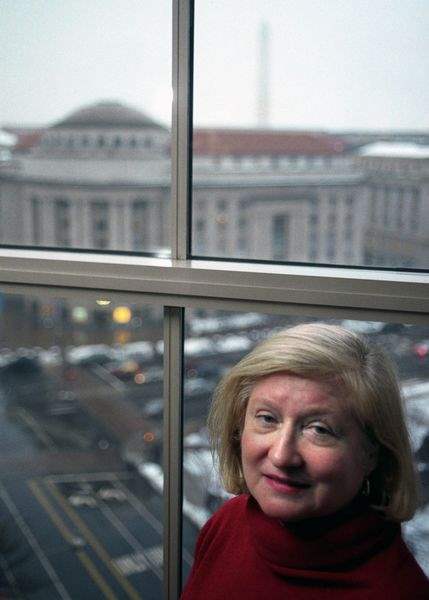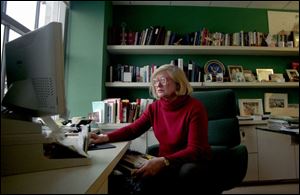
From Defiance to D.C.
3/23/2003
Judith Richards Hope's Washington office has a view of the Reagan Building.
Brian Price

Judith Richards Hope works at her office in Washington.
In 1962, The Blade's Sunday Magazine featured a story on a young woman whose big dreams were spelled out in the headline: “She Wants To Be A Harvard Lawyer.”
At that time, such an ambition was considered practically impossible, and even a little ridiculous, for a woman to realize. But the student, Judith Richards of Defiance, hardly seemed conscious of that.
“I have no academic goals other than to work as hard I can,” the 24-year-old student told The Blade. “The higher I can finish in my class, the better will be the job opportunity and salary. . [T]he harder I work now, I figure, the easier the rest of my life will be. Hard work is something like investing in savings bonds.”
Events proved the preacher's daughter from Defiance right - eventually. Today, Judith Richards Hope, 62, can look back at a bright career: She became the first female associate counsel for the White House in 1975, was a candidate for a federal judgeship in the 1980s, and has sat on the boards of such companies as Union Pacific and General Mills. She has taught law at prestigious universities, including her alma mater, and continues to practice law at the Washington office of the firm she co-founded. She carried the Olympic torch in December, 2001, in one half-mile leg of its journey to Utah, and recently wrote a book, Pinstripes and Pearls (Scribner, $26).
But the path to success was anything but straight and smooth. In her book, which chronicles the studies and careers of the 15 women in her Harvard Law Class of 1964, Mrs. Hope describes the obstacle-laden years between the paternalistic 1950s and feminist revolution that bore fruit in the 1980s.
Simply leaving Defiance posed a challenge, Mrs. Hope said in an interview from her office in Washington. For her undergraduate studies, she chose Wellesley College, an exclusive women's college in Massachusetts known for its rigorous academics. Accustomed to “egalitarian, no-nonsense, down-to-earth” Defiance, she found Wellesley a shock.
“It was not this level playing field I was used to in Defiance, Ohio,” she said. “There were girls who had come from families of enormous prominence and wealth. They had a whole society I would not, and could not, break into.
“One girl had cashmere sweaters and three-inch alligator heels. That was like Mars to me. I had no understanding of it. And they had no understanding of me.”
Mostly, she studied and worked, always with an eye on Harvard Law. When the time came, she submitted the one-page application. In late winter 1961, she was among the hundreds of young people to receive an acceptance letter and embark on “one of the hardest - and one of the best - times of our lives,” she wrote.
For women, Harvard Law School presented challenges beyond the ordinary. Former U.S. Rep. Patricia Scott Schroeder, a classmate, recalled some of the male students asking to have their seats changed “because they had never sat next to a girl in their entire educational lives.”

Judith Richards Hope's Washington office has a view of the Reagan Building.
One professor refused to call on women unless it was “Ladies' Day.” On the first such day, the case the professor assigned involved the fraudulent sale of woolen underwear.
The dean also had a tradition. He would invite all the female students in a class for dinner. After the meal, he would ask them, one by one, “Why are you at Harvard Law School, taking the place of a man?”
Even the buildings offered obstacles: during Mrs. Hope's entire time at Harvard Law, only two restrooms for women existed, at the south and north ends of the campus. The closer was about a block away from the main classroom and library building. Even during timed exams, women had to use those facilities, although a few used to sneak into the men's room if they could.
The experiences toughened the group.
“The women I went to law school with - we would not be put down,'' she said. “We would find a way to get where we were going, with integrity and style.”
But even law school couldn't entirely prepare the women for the challenges of the real world. For Mrs. Hope, the post-graduate obstacles started in Toledo, where she hoped to live and work.
“My plan was to go into politics in Ohio, be a lawyer in private practice, maybe run for the state legislature or federal office, and maybe one day run for attorney general of Ohio,” she said.
But the law firms here, and throughout Ohio, told her they didn't hire women lawyers, even though she had passed the Ohio bar and finished second in the state. However, a couple offered secretarial positions if she could pass their typing and shorthand tests.
Thwarted in Ohio, Mrs. Hope flew to Washington and brazened her way into the employ of top trial lawyer Edward Bennett Williams. During her time there, she met Tony Hope, son of comedian Bob Hope. They married in Defiance in 1967, with a lavish reception held at the Commodore Perry Hotel in Toledo.
After taking time off for their two children, Mrs. Hope joined the White House staff in 1975, during the Ford administration. She has remained close to the political world ever since - when her book was published earlier this year, a private party in her honor included classmate Stephen G. Breyer, along with Ruth Bader Ginsburg, Sandra Day O'Connor, Antonin Scalia, and David Souter, all U.S. Supreme Court justices, plus Vice President Dick Cheney and Federal Reserve Chairman Alan Greenspan, according to the Washington Post.
After four decades of hard work, she is trying to slow down, building a farmhouse on the 75-acre property she bought in Virginia in 1999.
“I find myself yearning to return to my beginnings - to the life I remember in rural Ohio at the time of my growing up,” she wrote.